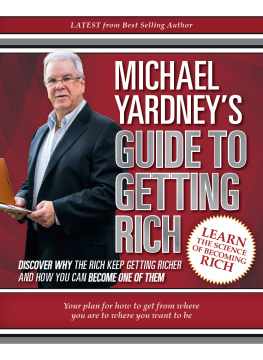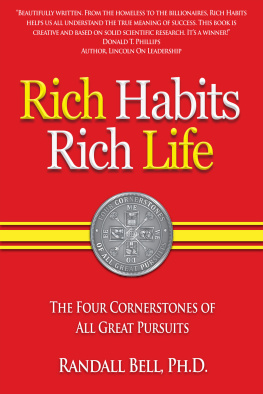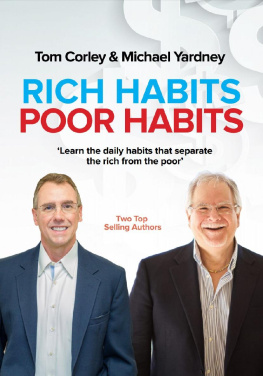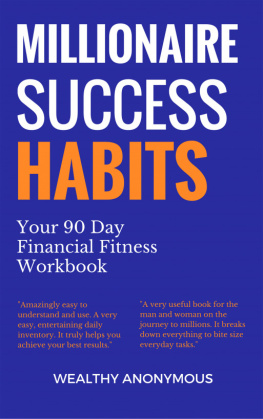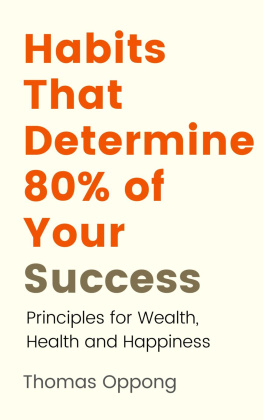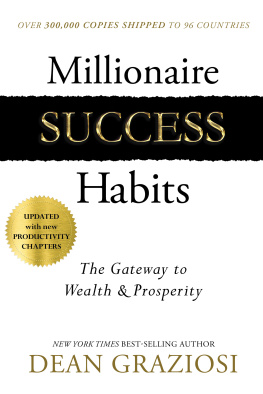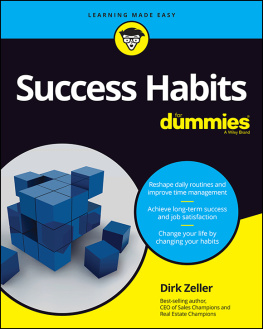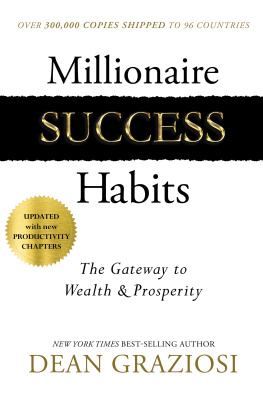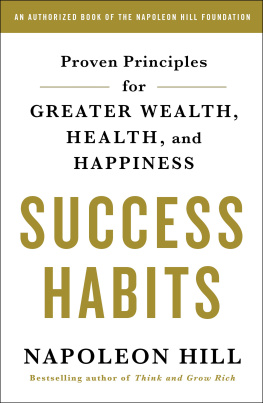Copyright 2009 by Thomas C. Corley.
All rights reserved. No part of this publication may be reproduced, stored in a retrieval system, or transmitted, in any form or by any means, electronic, mechanical, photocopying, recording, or otherwise, without the written prior permission of the author.
INTRODUCTION
The fact is: success is elusive. Why? Why are the rich so rich? Only about five percent of the population in the United States realizes true financial success. What traits do they possess that make them so successful? Few ever find out. Unfortunately, how to be financially successful in life is not a subject that is taught in our schools. We are all in the same boat, attempting through trial and error to figure it out on our own.
I have devoted years of researching the daily habits of wealthy people. I have incorporated what I have learned from my research into the Rich Habits Program, which is designed to provide timely, easy-to-follow guidance on achieving unlimited personal and financial success. Wealth is not just a byproduct of random luck, education, hard work, or inheritance. Financial success is a foolproof process. Within these pages is the twenty first century blueprint for financial success!
I am a certified public accountant and certified financial planner to more than one thousand individuals and small businesses. The genesis of this book began when a struggling client came to my office seeking advice. The clients business was growing; however, he had difficulty in making ends meet, particularly at payroll time. In sheer desperation he asked, What am I doing wrong? For months I analyzed his business, his expenses, processes, labor rates, and industry comparative data. I even sought advice from a rich client in the same industry, with a similar level of gross revenues and whose business shared comparable demographics. Together we could find nothing that stood out, no glaring deficiency.
At a lunch meeting with my struggling client, some weeks later, I confessed that I could not diagnose the cause of my clients financial problems. The client was not happy. I was not happy. We sat in silence at our table for some time. In an effort to break the uncomfortable silence I asked my client what he did when he came home at night. There was an immediate shift in my clients demeanor. An almost impish look took hold and he asked me, Which night?
Pick your favorite night, I suggested.
The client told me that would be Wednesday.
What do you do on Wednesday nights? I pressed the client.
The client leaned in, eyeing the restaurant and said ever so quietly, I get a couple of ladies of the night, a few bottles of wine and... The client, in response to my obvious look of shock, stopped mid-sentence. Im sorry, he said. I should not have shared that with you. I talk way too much sometimes.
I assured him that I was an Irish Catholic New York boy from a family of eight and that there was very little I had not seen in my life. My shock was not from moral indignation, but from the realization that I had been asking my client all the wrong questions these past months. The epiphany I had was that there was much more to financial problems than meets the eye and that I needed to ask the right questions. I eventually came up with a twenty-question list that, over a five-year period, I asked to just about every rich or poor client I had, as well as every business partner or person I knew.
The data I gathered from these questions made me realize that there is a difference the size of the Grand Canyon in the way rich people and poor people live their daily lives. This one client unknowingly took me down a path toward the discovery of the secret to financial success.
The Insurance Salesman
I just cant take it anymore, Phoenix Upman murmured into his half-empty pint glass. He ran his short, plump fingers through what little hair was left on his head as his cigarette burned out in the ashtray beside him.
Bad day? the bartender asked nonchalantly as he leaned over the bar, perusing the sports section. He didnt seem particularly interested, but pretended to be for his customers sake.
Phoenix managed a sort of angry snort that gave way to forced, hollow laughter. More like bad life. He drained the rest of his beer and slid the empty mug forward for a refill. Last night I had to tell my son that we could not afford to send him to college. we just dont have the money. We cant even swing tuition at Brookline.
Brookline, the local community college, gave discounted rates to county residents - practically giving away an education. The bartender sensed immediately how pathetic Phoenixs financial situation must be if he couldnt even afford Brookline. The bartender had managed to get himself through two years there with what little davings he had, supplemented by the tips from this place.
Not even Brookline, huh?
No, Phoenix said. He lit up another cigarette and took a long, slow drag, letting his eyelids close as he held in his breath.
This one is on me. The bartender set a fresh pint down in front of Phoenix and contemplated the troubled man. Although younger than the bartender, that was not obvious by looking at Phoenix. His receding hairline and expanding waistline made him look older, as did the deep crease between his eyes and the wrinkles snaked across his forehead. Nothing about him was particularly distinct. His shirtsleeves, rolled up to mid-forearm, had blotchy blue ink stains. What do you do for a living?
I sell insurance, he said, too quickly perhaps. What I mean is I try. What I make is barely enough to live on, let alone put away for something like college. Phoenix rolled a peanut between his thumb and forefinger, his gaze fixed somewhere across the bar. He sat for a long while, quiet, slowly rolling the peanut, unblinking. Howd I get to be such a failure? he murmured to himself.
The bartender returned to the article he was reading. Phoenix set the peanut down on the bar and wrapped his hand back around the cold glass, lifting the mug to his lips once again, draining his latest pint. You know, even if I died there's not much. I dont even have enough insurance to make that worthwhile. He slid the glass forward, signaling another refill. Some salesman I am, he muttered under his breath. He pinched the bridge of his nose and closed his eyes tight, scrunching up his face.
You driving, man? the bartender asked.
Im not far from here, just a few blocks. Ill be fine.
I dont know; youve been here a while.
Phoenix glanced at the bartender, a pleading look in his eyes. He knew he had worn out his welcome, but how could he go home and face his son after last night? It was clear the bartender was going to cut him off. Sensing this, Phoenix laid out some cash and pushed back from the bar. Without saying a word, he shrugged into his coat and cap, pulling his cap down tight on his head before making his way down the length of the bar toward the exit.
Outside was dark and Phoenix could see his breath hanging in the air before him. There were no stars; they were lost somewhere behind opaque December clouds. He made his way over to his black subcompact and fumbled in his pockets for the keys. Inside the car was not much better; he could feel his fingers going numb from the cold. Phoenix lit one last cigarette and sat back, waiting for the engine to warm up.


